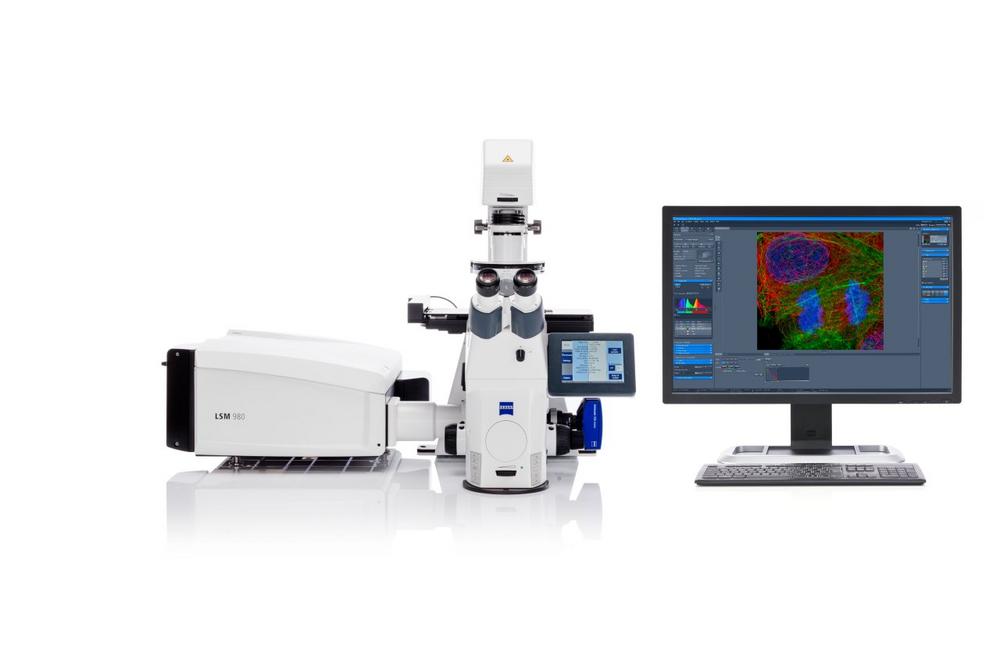The Multiplex mode is available for the whole ZEISS LSM 9 family: ZEISS LSM 980 is the flexible research platform with complementary multiphoton and superresolution capabilities. ZEISS LSM 900 is a very compact system that delivers image quality without complexity.
ZEISS LSM 980
The new ZEISS LSM 980 with Airyscan 2 is the ideal research platform for confocal 4D imaging. The entire beam path is optimized for simultaneous spectral detection of multiple weak labels with the highest light efficiency. Researchers benefit from the full flexibility of a point scanning confocal and the speed and gentleness of the sensitive ZEISS Airyscan 2 detector. The new Multiplex mode combines an elongated excitation laser spot and parallel pixel readout of this area detector. This allows acquiring up to eight image lines in a single sweep. Users can gently image larger fields of view with superresolution in shorter acquisition times than ever before.
ZEISS LSM 900
ZEISS LSM 900 with Airyscan 2 is a very compact confocal microscope for high-end imaging. This system has a genuinely small footprint, concentrating on the essence of a confocal and leaving out needless complexity. It fits easily into labs or imaging facilities and is optimized for ease of use. ZEISS LSM 900 can be combined with ZEISS Celldiscoverer 7 for automated confocal imaging with high efficiency.
The Multiplex mode
The new Multiplex mode provides more options to fit imaging speeds and resolution to experimental needs. It uses knowledge about the shape of the excitation laser spot and the location of single area detector elements within the ZEISS Airyscan 2 detector to extract more spatial information – even during parallel pixel readout. This allows bigger steps to be taken when sweeping the excitation laser over the field of view, improving achievable acquisition speeds. In fact, the large amount of spatial information captured in the pinhole plane allows the reconstruction of a final image with better resolution than the acquisition sampling.
ZEISS is an internationally leading technology enterprise operating in the fields of optics and optoelectronics. In the previous fiscal year, the ZEISS Group generated annual revenue totaling more than 5.8 billion euros in its four segments Industrial Quality & Research, Medical Technology, Consumer Markets and Semiconductor Manufacturing Technology (status: 30 September 2018).
For its customers, ZEISS develops, produces and distributes highly innovative solutions for industrial metrology and quality assurance, microscopy solutions for the life sciences and materials research, and medical technology solutions for diagnostics and treatment in ophthalmology and microsurgery. The name ZEISS is also synonymous with the world’s leading lithography optics, which are used by the chip industry to manufacture semiconductor components. There is global demand for trendsetting ZEISS brand products such as eyeglass lenses, camera lenses and binoculars.
With a portfolio aligned with future growth areas like digitalization, healthcare and Smart Production and a strong brand, ZEISS is shaping the future far beyond the optics and optoelectronics industries. The company’s significant, sustainable investments in research and development lay the foundation for the success and continued expansion of ZEISS‘ technology and market leadership.
With approximately 30,000 employees, ZEISS is active globally in almost 50 countries with around 60 of its own sales and service companies, more than 30 production sites and around 25 development sites. Founded in 1846 in Jena, the company is headquartered in Oberkochen, Germany. The Carl Zeiss Foundation, one of the largest foundations in Germany committed to the promotion of science, is the sole owner of the holding company, Carl Zeiss AG.
Further information at www.zeiss.com
Carl Zeiss Microscopy GmbH
Carl-Zeiss-Promenade 10
07745 Jena
Telefon: +49 (3641) 64-3161
http://www.zeiss.com/microscopy
PR
Telefon: +49 (3641) 64-3402
E-Mail: kristin.unger@zeiss.com
